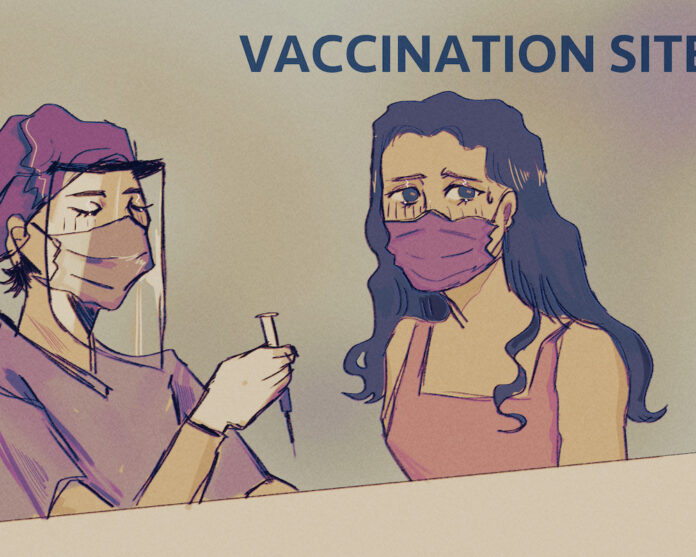Emmons Wellness Center has filed an application with the California Department of Public Health (CDPH) and the California Immunization Registry (CAIR) to be enrolled as an official COVID-19 vaccination site, according to Senior Director of Student Wellness and Special Advisor to the President on Health and Safety Sara Semal. The application is currently pending and, upon approval, will allow Emmons to distribute vaccines to Occidental College affiliates on a rolling basis, in line with California’s eligibility tiers.
Occidental’s decision to only administer vaccines to College community members — including staff, faculty, students and, quantity permitting, families of Occidental affiliates — arises from concerns about Emmons’ ability to function as a wider Los Angeles distribution site and the campus traffic such a program would invite, according to Semal.
“That said, being a vaccination site would offer our community convenient and timely access to the vaccine, as opposed to long wait times and difficulty scheduling through the large public vaccine administration sites,” Semal said via email.
Semal said that Emmons would have to wait until the county begins to distribute vaccines to community health centers before it could launch its program. Occidental College would not have control over the quantity or model of vaccines it receives, she added.
“Currently, there is insufficient supply to distribute widely beyond county administration sites and large hospital systems,” Semal said via email. “We hope that supply will increase and that distribution will begin in late February, early March, but there is no way to know for sure how long it will be before we are sent vaccines or how many they will send us once they do.”
According to Semal, a subcommittee of the COVID Health and Safety Committee is currently developing a priority list for vaccination that closely follows the prioritization guidelines established by California and the Centers for Disease Control and Prevention (CDC). As of Feb. 7, healthcare workers, long-term care residents, individuals 65 or older and some education, childcare, emergency services, food and agriculture employees are eligible for vaccination in California, according to California’s COVID-19 Website. Access will be slowly expanded to descending age groups as supply allows.
“The next step after finalizing the eligibility and prioritization list [is] to begin a registry of individuals interested in receiving the vaccine,” Semal said via email. “We will be sending this out in the next few weeks so that we can be ready to begin implementing as soon as we receive the vaccine.”
Semal said she could not predict when Emmons’ vaccination site would be operational and that those who are able to receive the vaccine elsewhere should do so. According to KTLA5, there are currently 360 vaccination sites operational in LA County, though five mega-sites — including Dodger Stadium, one of the nation’s largest — account for the most distribution. County-wide supplies, however, are tightening, and officials are prioritizing the distribution of second doses, ABC7 reported Feb. 6.
Discussing the wider logistics and ethics of vaccine distribution, philosophy professor Erica Preston-Roedder, who teaches a course on bioethics, said that vaccination campaigns must simultaneously consider two values — utility and equity. While the former involves vaccinating as many people as quickly as possible, the latter calls for targeted programs to ensure historically disadvantaged communities, such as Black and Latinx communities, are included, if not prioritized, according to Preston-Roedder.
“Those two values have been in some conflict at times,” Preston-Roedder said.
While professionals have had many years to develop ethical guidelines for processes like distributing organ transplants, Preston-Roedder said, the scarcity of vaccines and urgency of the COVID-19 pandemic has made developing a timely and ethical distribution system more difficult.
“We are building the airplane and flying it at the same time,” Preston-Roedder said.
Preston-Roedder added that she thinks the Emmons vaccination site will be most beneficial for staff members who might not have the time or a method of transportation to go to more distant vaccination sites.
“In a perfect world, Oxy would offer healthcare beyond its immediate community, as a way of building community ties,” Preston-Roedder said via email. “However, given the size of Emmons’ staff, this is not a realistic and safe option for Oxy right now.”
Bhavna Shamasunder, co-chair of Occidental’s public health department, said that Semal has been transparent in faculty meetings about Emmons’ application process and the importance of Occidental community members getting vaccinated elsewhere should the opportunity present itself.
“I think for the community of Oxy, it’s a really good safety net,” Shamasunder said.
According to Semal, the vaccination program would not be any larger or more disruptive than the flu shot clinics Emmons runs on an annual basis.
“If we are able to vaccinate our community at large, we hope to then be able to vaccinate family members of our community, but this should not add to the overall density or traffic on campus,” Semal said via email.
The college has not yet decided whether vaccinations will be required for students should Occidental resume in-person instruction in Fall 2021, Semal said, adding that the number of Occidental affiliates vaccinated through Emmons will depend on the number of doses allocated to Emmons by the county.
![]()



































